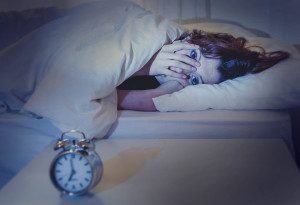Sleep disorders come in many forms ranging from sleep apnea (low breathing or pauses in breathing that result in not enough oxygen getting to the brain, resulting in waking) to insomnia, which makes it difficult to get to sleep and/or remain asleep. Though we all experience trouble falling asleep sometimes and may even find it difficult to stay asleep occasionally, a sleeping-related disorder is much more serious. It can impact our daily lives and our health, making it important to get treatment.
Sleep Insomnia Symptoms
Insomnia is the most common complaint that Americans make when referring to sleep. If it lasts for one or a few nights, it is classified as acute and when it persists for longer than one month, it is labeled as chronic. Approximately 10 to 15 percent of adults report the chronic version according to the National Center for Sleep Disorders Research. However, this usually takes a chronic-intermittent form rather than persisting every night for months or years.
Symptoms include difficulty falling asleep, waking up frequently, and having trouble returning to sleep (sleep maintenance insomnia). Many sufferers awaken too early in the morning and even though they do not feel refreshed, they get up because they cannot fall back asleep. This leads to daytime sleepiness, and often causes trouble concentrating, irritability, anxiety and depression. There is an estimated 15% risk of mortality in women who chronically sleep less than 3.5 hours per night and in men who chronically sleep less than 4.5 hours per night.
Sleep Insomnia May Be a Symptom Itself
This condition may be simply a sleep disorder but it also may be a symptom of another condition or disease. Approximately half of all sufferers attribute their sleeplessness to worrying or stress. Individuals who have difficulty falling asleep on a regular basis should see a doctor to determine whether an underlying condition or disease exists. Insomnia may also be caused by digestive issues, pain or serious medical and psychiatric disorders.
The condition may also be a symptom of anxiety or depression. Lack of sleep can make these and other underlying conditions worse because the individual is tired and unable to think clearly or cope with a situation. A doctor will conduct a physical exam and have the patient complete a medical and family history questionnaire to determine whether another condition is manifesting itself as sleeplessness.
If it is often difficult to fall and stay asleep, insomnia may be to blame. This condition may be the result of stress, a response to change or it may be a symptom of another condition. Left untreated, it can increase risk of illness. Research shows that sufferers have poorer overall health, increased absenteeism from work and a higher incidence of depression.
Here are two sites with some more, valuable tips and information on insomnia:
- American Academy of Family Physicians handout
- Top Ten Sleep Tips” from National Sleep Foundation
Article content, © Kira Stein, MD, APC. | West Coast Life Center

